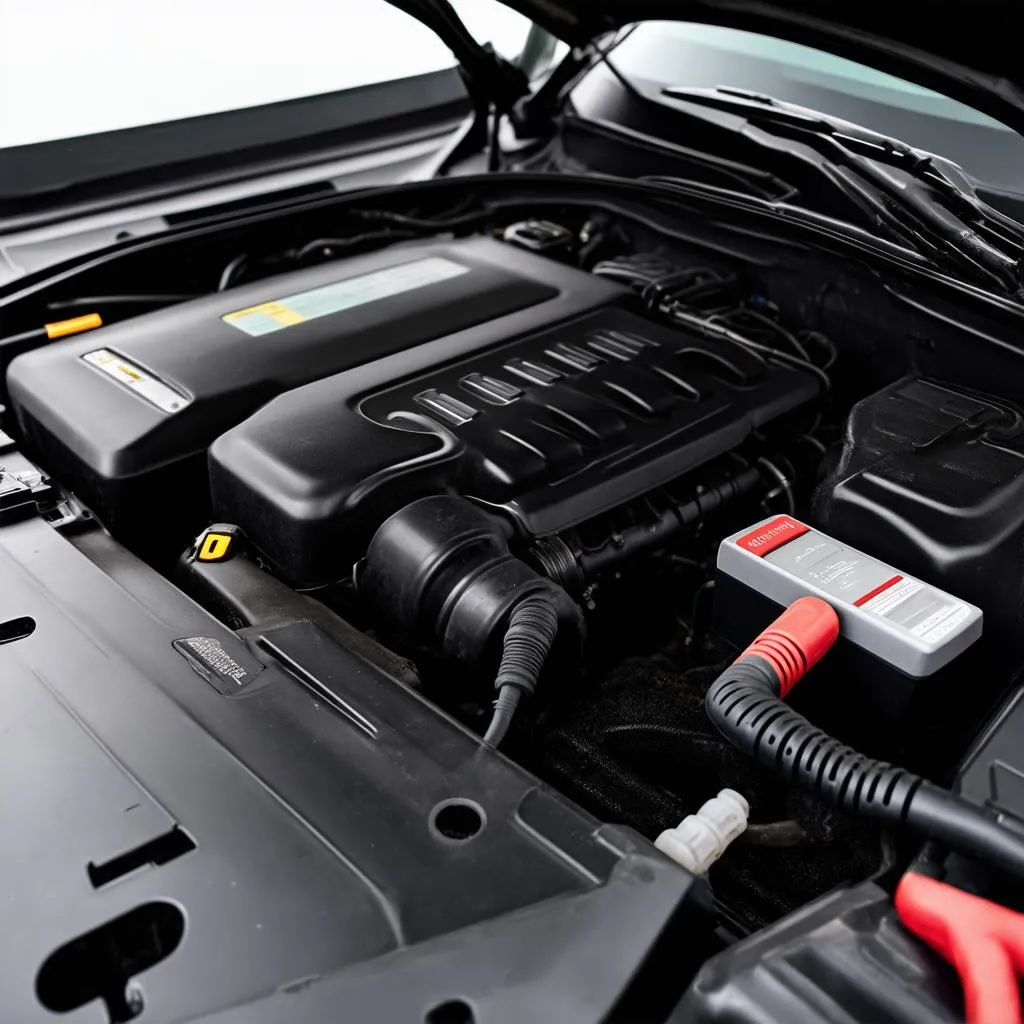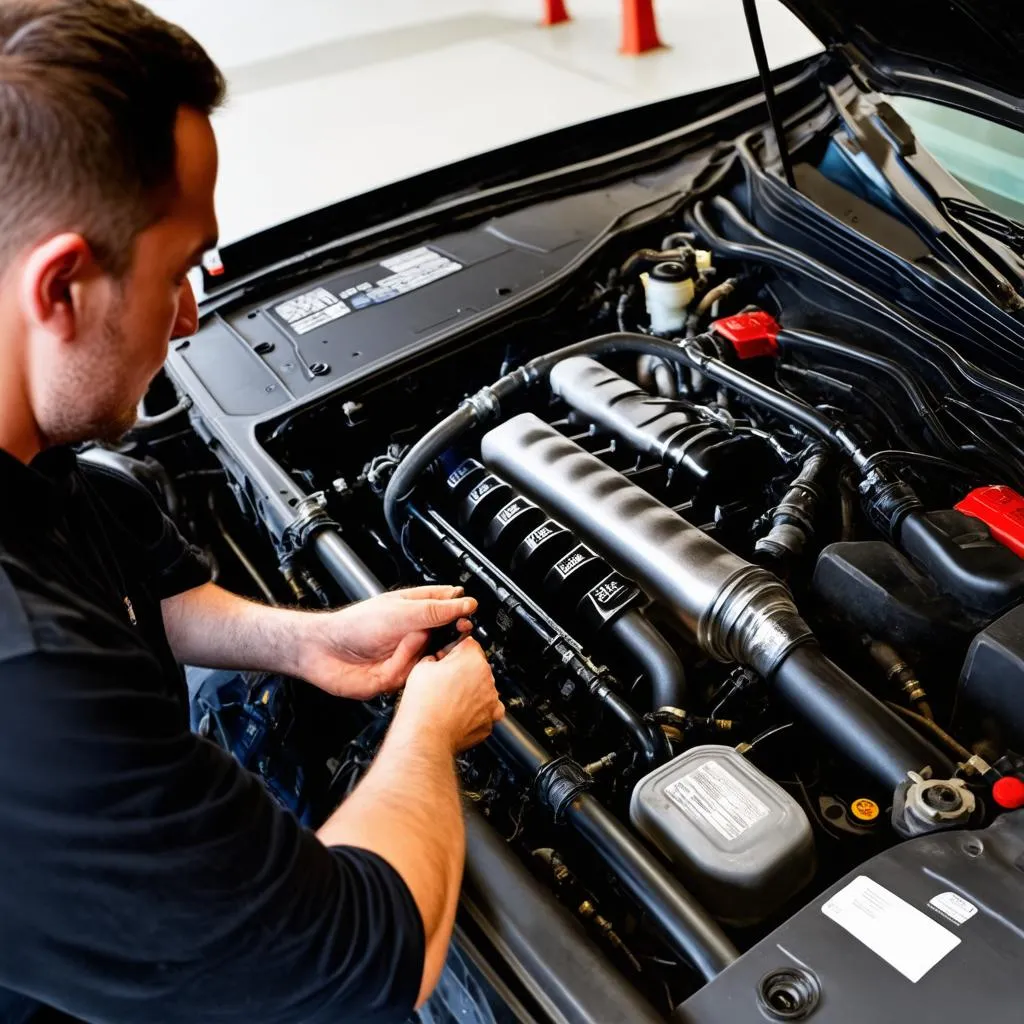Demystifying VCDS Error Code 00929: A Comprehensive Guide
Imagine this: you’re about to embark on a road trip, the open road beckoning, only to be greeted by a stubborn engine light staring back at you. A quick scan with your trusty VCDS diagnostic tool reveals the cryptic message: “00929.” Suddenly, the excitement turns to dread. What does it mean? How serious is it? Don’t worry, you’re not alone! This comprehensive guide will unravel the mysteries of VCDS error code 00929, providing you with the knowledge to get back on the road with confidence.
Understanding VCDS Code 00929: What Does It Mean?
In the intricate language of your car’s computer, the VCDS error code 00929 translates to “Intake Air Temperature Sensor 1 (G42) – Implausible Signal.” To break it down:
- Intake Air Temperature Sensor (G42): This sensor is a vital component of your car’s engine management system. It measures the temperature of the air entering the engine, allowing the ECU (Engine Control Unit) to optimize the air-fuel mixture for optimal performance and fuel efficiency.
- Implausible Signal: This indicates that the signal being sent by the G42 sensor to the ECU is outside the expected range. This could be due to a faulty sensor, wiring issues, or even a problem with the ECU itself.
“Think of the G42 sensor as the thermostat for your engine,” explains automotive expert Dr. Emily Carter in her book “Modern Automotive Diagnostics.” “Just like a faulty thermostat can disrupt the temperature in your home, a malfunctioning G42 sensor can wreak havoc on your engine’s performance.”
Common Symptoms of VCDS Code 00929
Now that we understand what the code means, let’s look at some telltale signs that might suggest your G42 sensor is acting up:
- Illuminated check engine light: This is often the first and most obvious indication of a problem.
- Rough idling: The engine might hesitate or stumble when idling, particularly when cold.
- Reduced fuel economy: An inaccurate air temperature reading can lead to a richer fuel mixture, impacting your car’s mpg.
- Decreased engine performance: You might notice a loss of power, especially during acceleration.
- Black smoke from the exhaust: This indicates an overly rich fuel mixture, which could be caused by a faulty G42 sensor.
What Causes VCDS Error Code 00929?
A range of factors can contribute to a Vcds 00929 error, including:
- Faulty Intake Air Temperature Sensor (G42): Over time, the sensor can become contaminated with dirt, oil, or other debris, affecting its accuracy. In some cases, the sensor itself may fail entirely.
- Wiring Problems: Damaged, corroded, or loose wiring between the G42 sensor and the ECU can disrupt the signal transmission.
- Vacuum Leaks: Any leaks in the intake manifold or vacuum hoses can affect the air pressure readings, potentially triggering the code.
- ECU Issues: While less common, a problem with the ECU itself can also cause this error code.
How to Diagnose and Fix VCDS Error Code 00929
While it’s always recommended to consult a qualified mechanic for a thorough diagnosis, here are some steps you can take to troubleshoot the problem:
- Inspect the G42 Sensor: Visually examine the sensor for any signs of damage, contamination, or loose connections.
- Check the Wiring: Trace the wiring harness from the G42 sensor to the ECU, looking for any breaks, fraying, or corrosion.
- Test the Sensor: Using a multimeter, you can test the sensor’s resistance and voltage to determine if it’s functioning within specifications.
- Inspect for Vacuum Leaks: Use a carburetor cleaner or propane torch (with caution!) to check for leaks in the intake manifold and vacuum hoses.
Frequently Asked Questions About VCDS Code 00929
Can I still drive my car with a VCDS code 00929?
While you might be able to drive for a short distance, it’s not recommended to ignore this error code. Driving with a faulty G42 sensor can lead to reduced fuel economy, increased emissions, and potentially more severe engine problems in the long run.
How much does it cost to fix VCDS code 00929?
The cost of repair can vary depending on the underlying cause and the make and model of your vehicle. Replacing the G42 sensor is usually a relatively inexpensive fix, while addressing ECU issues can be more costly.
How do I prevent VCDS code 00929 from recurring?
Regularly inspecting and cleaning the G42 sensor, along with addressing any vacuum leaks promptly, can help prevent this code from reappearing.
 Car Engine Diagnostic
Car Engine Diagnostic
Related VCDS Error Codes
Here are some other VCDS error codes that are often related to the intake air temperature sensor:
- 00928 – Intake Air Temperature Sensor 1 (G42): Short to Plus
- 00930 – Intake Air Temperature Sensor 1 (G42): Open or Short to Ground
- 16486 – Intake Air Temperature Sensor (G42): Implausible Signal
Car Makes Often Affected by VCDS Code 00929
While this error code can occur in various car makes, some models are more prone to experiencing G42 sensor issues, including:
- Volkswagen
- Audi
- Seat
- Skoda
Need More Help with Your Car Diagnostics?
Don’t let car troubles slow you down! If you’re struggling to diagnose or fix a VCDS error code, our team of automotive experts is here to help. Contact us on Whatsapp at +84767531508 for expert advice and support. We offer a range of diagnostic tools and services to get you back on the road quickly and safely.
 Mechanic Inspecting Car Engine
Mechanic Inspecting Car Engine
Conclusion
Understanding and addressing VCDS error codes is crucial for maintaining the health and performance of your vehicle. While encountering error code 00929 might seem daunting, armed with the information in this guide, you can confidently approach the issue and get your car running smoothly again. Remember, regular maintenance and prompt attention to warning signs can go a long way in preventing future headaches on the road.
For more helpful articles and resources on car diagnostics and repair, explore our website cardiagxpert.com.
Do you have any questions or experiences to share about VCDS error codes? Leave a comment below – we’d love to hear from you!
